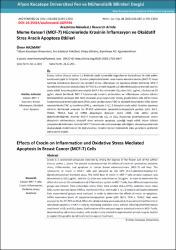Meme kanseri (MCF-7) hücrelerinde krosinin inflamasyon ve oksidatif stres aracılı apoptoza etkileri
Künye
Hazman, Ö. (2021). Meme Kanseri (MCF-7) Hücrelerinde Krosinin İnflamasyon ve Oksidatif Stres Aracılı Apoptoza Etkileri . Afyon Kocatepe Üniversitesi Fen Ve Mühendislik Bilimleri Dergisi , 21 (6) , 1295-1305 . DOI: 10.35414/akufemubid.1025594Özet
Krosin, safran (Crocus sativus L.) bitkisinin çiçek kısmındaki stigmalarının kurutulması ile elde edilen karotenoid yapılı bir bileşiktir. Sunulan çalışmada krosinin insan meme adenokarsinomu (MCF-7) hücre hattında sitotoksisite düzeyleri ile oksidatif stress, inflamasyon ve apoptoza etkileri belirlendi. MCF-7 hücrelerinde krosinin sitotoksisitesi, MTT (3-4,5-dimetil-tiyazolil-2,5-difeniltetrazolyum bromid) testi ile analiz edildi. Krosinin günlük maruziyette MCF-7 hücrelerindeki LD50 dozu 1611 µg/mL, LD0 dozu ise 20 µg/mL olarak belirlendi. MCF-7 hücrelerinde krosinin antioksidan ve inflamatuvar sisteme etkisini belirleyebilmek amacıyla dört farklı deneysel grup oluşturuldu. Deney gruplarından elde edilen hücre lizatlarında total antioksidan statü (TAS), total oksidan statü (TOS) ve oksidatif stres indeksi (OSI), tümör nekrozis faktör (TNF) α, interferon (IFN) γ, ınterlöykin 1 (IL1) β düzeyleri analiz edildi. Krosinin apoptoza etkilerini belirlemek amacıyla ise RT-PCR yöntemiyle apoptotik/antiapoptotik genlere (p53, Bcl-2, TRAIL1, TRAIL2, Bax) ait mRNA ekspresyon düzeyleri analiz edildi. Elde edilen veriler değerlendirildiğinde, krosinin MCF-7 hücrelerinde LD0 ve LD50 dozlarında proinflamatuvar stokin düzeylerini etkilemeksizin oksidatif stresi artırarak apoptozu uyardığı tespit edildi. Hücre kültürü çalışmaları ile belirlenen, krosinin MCF-7 hücrelerinde antikanserojen etkinliğinin, deney hayvanlarında oluşturulacak modellemeler ile doğrulanması, krosinin kanser tedavisinde olası yararlarını açıklamak adına yararlı olabilir. Crocin is a carotenoid compound obtained by drying the stigmas of the flower part of the saffron (Crocus sativus L.) plant. The present study determined the effects of crocin on cytotoxicity, oxidative stress, inflammation, and apoptosis in human breast adenocarcinoma (MCF-7) cell lines. The cytotoxicity of crocin in MCF-7 cells was analyzed by the MTT (3-4,5-dimethyl-thiazolyl-2,5diphenyltetrazolium bromide) assay. The LD50 dose of crocin in MCF-7 cells at daily exposure was determined as 1611 µg/mL, and the LD0 dose was determined as 20 µg/mL. In order to determine the effect of crocin on the antioxidant and inflammatory system in MCF-7 cells, four different experimental groups was formed. Total antioxidant status (TAS), total oxidant status (TOS), oxidative stress index (OSI), tumor necrosis factor (TNF) α, interferon (IFN) γ, interleukin 1 (IL1) β levels in cell lysates obtained from experimental groups were analyzed. In order to determine the effects of crocin on apoptosis, mRNA expression levels of apoptotic/antiapoptotic genes (p53, Bcl-2, TRAIL1, TRAIL2, Bax) were analyzed by the RT-PCR method. When the obtained data were evaluated, it was determined that crocin stimulated apoptosis in MCF-7 cells by increasing oxidative stress without affecting proinflammatory stock levels at LD0 and LD50 doses. Confirmation of the anticarcinogenic activity of crocin in MCF-7 cells, determined by cell culture studies, with models to be created in experimental animals may be helpful to explain the possible benefits of crocin in cancer treatment.
Kaynak
Fen ve Mühendislik Bilimleri DergisiCilt
21Sayı
6Bağlantı
https://dergipark.org.tr/tr/download/article-file/2088839https://hdl.handle.net/11630/10773
Koleksiyonlar
- Cilt 21 : Sayı 6 [20]



















